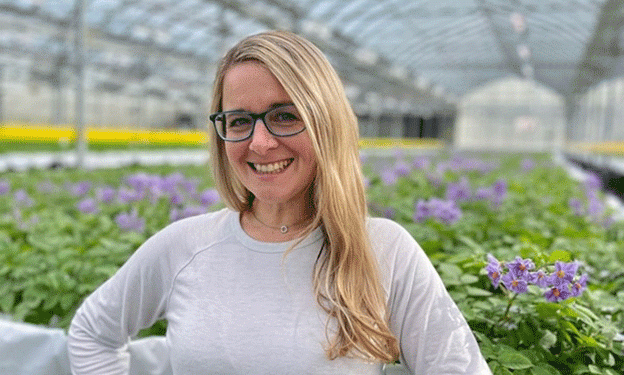When Alison Sklarczyk graduated from Michigan State University with a degree in animal sciences, her future in potato farming was the last thing on her mind. Yet, life had other plans. Today, Sklarczyk Seed Farm, located in Johannesburg, Michigan, stands at the forefront of the potato industry, growing over 10 million disease-free mini tubers annually. This innovative farm is not just another potato operation; it represents a model for sustainability and technological advancement in agriculture.
The Role of Tissue Culture in Potato Farming
At the heart of Sklarczyk Seed Farm’s success is its state-of-the-art tissue culture lab, designed to grow clean, disease-free seed potatoes in a controlled environment. Alison’s background in laboratory research, focusing on antibiotic resistance, seamlessly translates to her current role. “Instead of growing E. coli and salmonella, I’m growing tissue plants,” she explains, highlighting the unexpected but beneficial connections between her past and present.
The lab plays a crucial role in meeting contract orders from growers who require specific varieties of clean mini tubers. This method significantly reduces the risk of disease transmission, which is a persistent challenge in traditional potato farming.
Hydroponic Innovations and Global Reach
With 50,000 square feet dedicated to hydroponic greenhouse production, the farm utilizes advanced technologies to optimize growth. Hydroponics allows for greater control over plant nutrition and reduces reliance on soil, which can harbor pathogens. Despite the limitations of not being able to fully replicate natural sunlight, Alison’s team employs grow lights that adjust automatically to optimize energy use, enhancing both efficiency and sustainability.
Their impact extends beyond local markets, with seed potatoes shipped across the U.S., Canada, Mexico, Chile, and even the Middle East. Alison recounts a memorable experience: “We once bought a bag of chips in Chile that turned out to be made from potatoes grown from our seed potatoes.” Such moments serve as reminders of the far-reaching influence of their work.
Sustainable Practices: A Commitment to the Future
Alison and her family are deeply committed to sustainability. The farm harnesses geothermal and solar energy, upgrading lighting systems to improve energy efficiency. Moreover, they employ GPS-guided technologies for precision farming, ensuring efficient use of resources such as water and fertilizers. “If we don’t take care of the land we have, eventually it won’t be here, or it won’t be good quality,” Alison emphasizes, underscoring the need for responsible stewardship of agricultural land.
This focus on sustainability aligns with broader trends in agriculture. The global push for environmentally friendly practices is increasingly crucial as farmers face challenges from climate change and soil degradation. By demonstrating that sustainable practices can coexist with high productivity, Sklarczyk Seed Farm serves as a model for others in the industry.
The Bigger Picture: Feeding the World Sustainably
As the demand for potatoes continues to grow globally, innovative solutions like those at Sklarczyk Seed Farm are essential in addressing food security. By producing clean and disease-free mini tubers, they not only contribute to healthier crops but also support the larger agricultural ecosystem.
The farm’s commitment to sustainability, technological integration, and community awareness reflects a growing recognition within the agricultural sector that innovation and responsibility can go hand in hand.
A Path Forward for the Potato Industry
Sklarczyk Seed Farm exemplifies how modern agriculture can leverage science, technology, and sustainability to produce high-quality crops while maintaining environmental integrity. As the potato industry navigates the challenges of the future, farms like Sklarczyk’s are paving the way for sustainable practices that ensure a stable food supply for generations to come.







